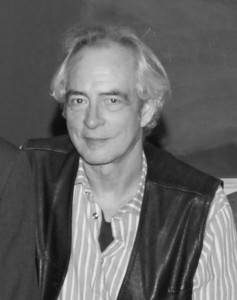Towson University faculty, staff, students and alumni are remembering longtime Philosophy Professor Walt Fuchs, who died of cancer last month in Germany.
“It’s so hard to distill him,” said Department Chair Anne Ashbaugh. “In the day-to-day experience with him, one was always enriched.”
In the weeks since his Feb. 11 death, students, alumni and faculty spoke of a man who made them laugh, made them learn, and made them think—not just as a teacher, but as a person.
“He was constantly giving away his time, his attention, his wit and charm,” fellow philosophy professor and close friend Stephen Scales said at a memorial service. “Walt showed me that the expression ‘I can’t apologize to her, because I’m right’ was simply a failure of my own imagination. And hence, I am still married.”
Charles Comer, an alumnus and current assistant professor of philosophy at Harrisburg Area Community College, said Fuchs’ role in his life was profoundly inspiring.
“When I think back [to] that time and what I remember really wanting out of life, of my hopes for being a professor, and what kind of professor I aspired to be, my thoughts invariably drift to Dr. Fuchs,” Comer said.
“Whatever he had, so many of us wanted [it],” he remembered. “He was a bit of a hero for a good many of us…one who could be amazingly smart and still possess an effortless cool.”
Indeed, nearly everyone who shared their reflections on Fuchs mentioned the rebellious look of the black leather vest and cigarettes, the captivating way of talking to students both inside and outside the classroom. Their descriptions were an almost Hollywood version of a college kid’s dream professor: one who taught “deep” material in a way that made sense—and made them want to be just like him.
“As a teacher of philosophy myself, I always try to keep in mind his humility and humor in explaining the history of great ideas and how they are important for us today,” said Randy Wheeler, another of Fuchs’ former students, now on Towson’s faculty.
But Fuchs reached beyond those he taught. Students who never studied with him learned from him, too.
“He was truly an amazing person, and I can say that even as someone who never had a class with him,” said Madeline Georgevich ’14, who is majoring in philosophy. “His presence and importance were pervasive and truly felt by all who came in contact with him.”
As if his talents in teaching and relating were not enough, Fuchs also impressed peers with his management ability. In 2008, an accident left Ashbaugh unable to work for a long period. Fuchs, who had been on the faculty for nearly 40 years, became the acting chair of the department until her return, a time College of Liberal Arts Dean Terry Cooney recalled at the memorial service.
“At risk of modest damage to his public image, it can now be revealed: he was a good administrator,” Cooney quipped.
But Cooney also recalled the last long exchange he’d had with Fuchs, not long before Fuchs’ death. “In the midst of that conversation, he said—as I suspect he did to a number of people—that he had done what he wanted to do in his life. What a great thing to be able to say and mean.”
Scales said most of the time, Fuchs’ lessons could be put into three categories. “He encouraged us to keep reading and learning, he helped us laugh, and he made us think and see our own freedom.”
For some students, he gave one more invaluable gift: cherished time.
“I learned through experience that Dr. Fuchs would help his students in any way that he could,” said Matt Hoepfl ’12. “He helped through academic advising, writing letters of recommendation, and in other ways, such as suggesting advice about life situations in a way that only an existential phenomenologist could.”
Daniel Michael Murphy ’10 said working on his independent study with Fuchs is his favorite of many Towson memories.
“He has been one of the most important figures in my life,” said Murphy. “He was a wonderful man and a caring professor.
“For me, he made Towson into Towson.”

